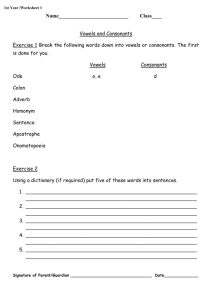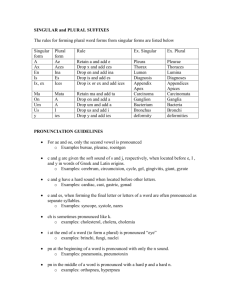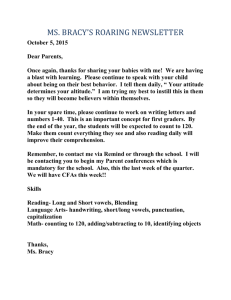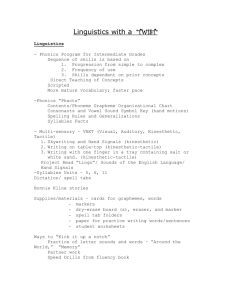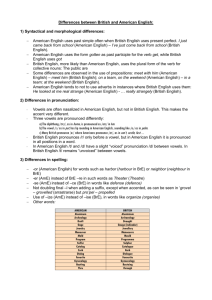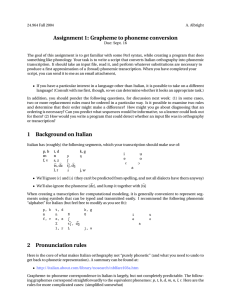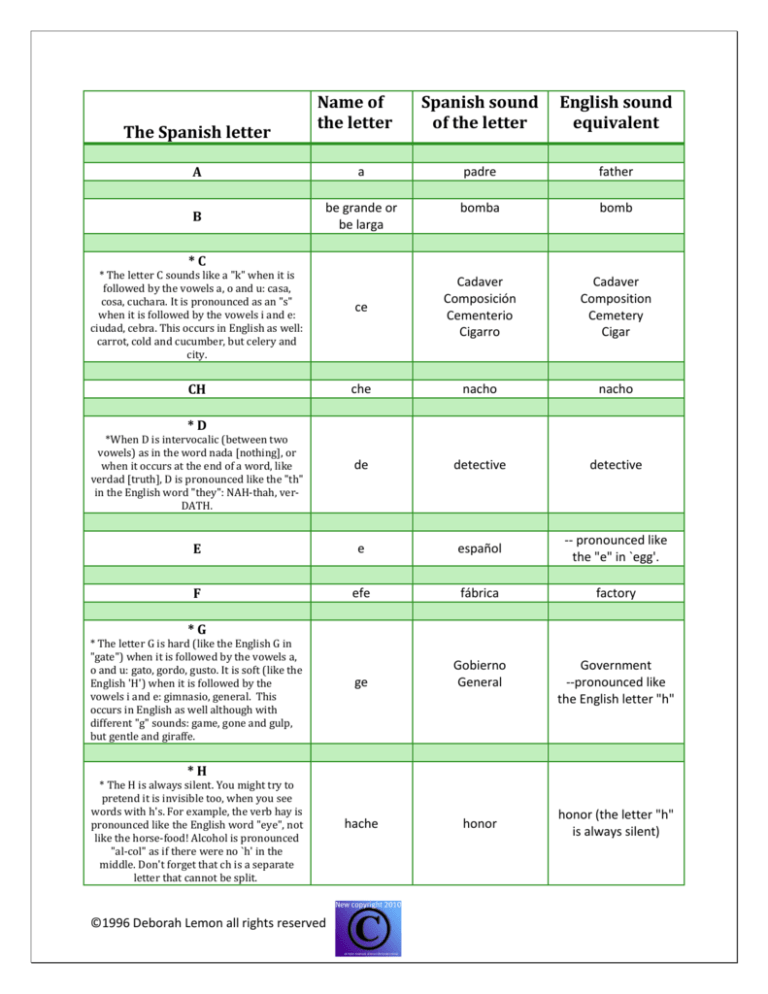
The Spanish letter
Name of
the letter
Spanish sound
of the letter
English sound
equivalent
A
a
padre
father
B
be grande or
be larga
bomba
bomb
ce
Cadaver
Composición
Cementerio
Cigarro
Cadaver
Composition
Cemetery
Cigar
che
nacho
nacho
de
detective
detective
E
e
español
-- pronounced like
the "e" in `egg'.
F
efe
fábrica
factory
ge
Gobierno
General
Government
--pronounced like
the English letter "h"
hache
honor
*C
* The letter C sounds like a "k" when it is
followed by the vowels a, o and u: casa,
cosa, cuchara. It is pronounced as an "s"
when it is followed by the vowels i and e:
ciudad, cebra. This occurs in English as well:
carrot, cold and cucumber, but celery and
city.
CH
*D
*When D is intervocalic (between two
vowels) as in the word nada [nothing], or
when it occurs at the end of a word, like
verdad [truth], D is pronounced like the "th"
in the English word "they": NAH-thah, verDATH.
*G
* The letter G is hard (like the English G in
"gate") when it is followed by the vowels a,
o and u: gato, gordo, gusto. It is soft (like the
English 'H') when it is followed by the
vowels i and e: gimnasio, general. This
occurs in English as well although with
different "g" sounds: game, gone and gulp,
but gentle and giraffe.
*H
* The H is always silent. You might try to
pretend it is invisible too, when you see
words with h's. For example, the verb hay is
pronounced like the English word "eye", not
like the horse-food! Alcohol is pronounced
"al-col" as if there were no `h' in the
middle. Don't forget that ch is a separate
letter that cannot be split.
©1996 Deborah Lemon all rights reserved
honor (the letter "h"
is always silent)
i
i
policía
police
J
jota
justicia [justice]
--pronounced like the
English letter "h"
ka
kilómetro
kilometer
ele
legal
legal
*K
*K is a foreign letter and used only in words
borrowed from other languages.
L
LL
elle
llave [key]
--pronounced like the
English letter "y", as
in "yahoo"
M
eme
madre
mother
N
ene
nacionalidad
nationality
Ñ
eñe
cañón
canyon
O
o
votar
vote
P
pe
península
peninsula
cu
química
Chemistry
ere
pariente [a relative]
--a 'tap' like the 'd'
sound in the English
word 'ladder'
*Rr is spelled r when beginning a word: rojo
[red], but is spelled rr when it occurs within
a word: pelirrojo [redhead]
erre
radio
--a 'trill', extend the
'tap'
S
ese
sopa
soup
T
te
texto
text
*Q
*Q never occurs without u, so think of Qu as
one letter. Qu is always pronounced like a
`k'. It never makes the `kw' sound as it does
in English. Try to visualize a K every time
you see Qu.
*r
*r occurs only within a word. It cannot
begin a word.
* rr
©1996 Deborah Lemon all rights reserved
u
uniforme
--pronounced like the
English 'u' in 'tutor'
ve chica/ve
corta
vendaje
bandage
*W
doble ve or uve
doble
Washington
Washington
X
equis
excelente
excellent
Y
i griega
Yucatán
Paraguay
Yucatan
Paraguay
zeta
zapatos [shoes]
--an 's' sound, as in
'socks'
U
*V
*V is pronounced the same as B. The names
ve chica and be grande mean `little b' and
`big b' respectively. A common native
speaker error is to switch these letters
when writing. Do not pronounce this letter
like the English letter `v'. Both V and B are
pronounced like a softened version of the
English letter `b'.
*W is a foreign letter and used only in
words borrowed from other languages.
*Z
*Z occurs only in front of strong vowels (A,
O, U.) The Z "time-shares" the vowels with
C. C also has a soft "S" sound in front of the
weak Vowels (I, E.) Therefore, when the Z is
placed in a position where it is faced with a
weak vowel, it changes into the letter C. (for
example, we spell pencil "lápiz" but the
plural form pencils needs to change the Z to
C "lápices.")
©1996 Deborah Lemon all rights reserved

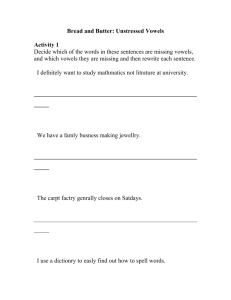
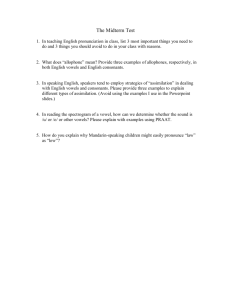
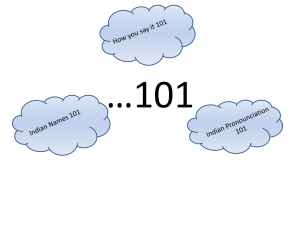
![A. Exercises from the textbook: Phonology problems # C ] [ front V](http://s3.studylib.net/store/data/008175941_1-b457726daf136c35872e622624895a8a-300x300.png)
